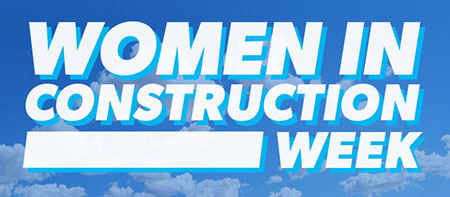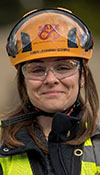|
Subscribe / Renew |
|
|
Contact Us |
|
| ► Subscribe to our Free Weekly Newsletter | |
| home | Welcome, sign in or click here to subscribe. | login |
Construction
| |
 |
March 6, 2023
Breaking barriers: inspiring stories of women in construction
University of Washington
National Women in Construction Week is celebrated on the first full week of March. The annual recognition of the 10.9% of women in the construction industry serves an important purpose: To celebrate and raise awareness of women’s contributions to this male-dominated industry. The four women highlighted below represent a combined 81 years of experience and are eager to offer their advice as role models for the next generation of women who will join this incredible industry.
GARNETTE ROUSE
CONCRETE BIM/VDC MANAGER
HOFFMAN STRUCTURES

“It is not all about swinging hammers.”
Garnette’s journey
Garnette has over 39 years of experience in the construction industry, and her passion for drawing started at a young age. Her father was a land surveyor, and he inspired her to pursue a career in drafting. She earned an associate’s degree in architectural drafting at community college in Spokane, where she was one of only two women in her class.
Building a career
After graduating, she started her construction career as a rebar detailer and worked her way up the ladder by traveling across the country working in over 30 site trailers on different projects. Garnette attributes her success by building respect with the crafts and being open to learning from them. She built on her knowledge by working with the carpenters and asking them questions. “I learned everything I know from the construction workers,” she said.
Current role
As a concrete BIM/VDC manager at Hoffman Structures, Garnette plays a crucial role in working closely with the field and overseeing a team of international structural detailers. She is involved in both domestic and international projects that are being built by Hoffman.
Women working in the field — building respect
When she started in the field, there were very few women. When asked if she felt like an outsider as a woman in the field, Garnette quickly responded, “No, I was just part of the crew.” She built respect with the craftworkers and earned a reputation for being knowledgeable, reliable, and skilled.
Advice to women starting their career
Garnette advises women who are starting their careers in the construction industry to explore different opportunities, such as internships and apprenticeships, to help make informed career decisions. Additionally, she highlights the value of building strong relationships with colleagues and mentors who can provide guidance and support along the way. She wishes that more women were interested in a career in BIM and VDC, as she believes it is a great career path for those who have a two-year technical degree. As a woman who has achieved great success with an associate’s degree, she encourages women to explore various paths and careers within the industry.
TARA HARRINGTON
ASSISTANT PROJECT MANAGER
HOWARD S. WRIGHT, A BALFOUR BEATTY COMPANY
“Women are a powerful and dynamic force in our industry.”

Tara’s journey
Tara’s journey into construction began in high school during an economics class where students were asked to choose a career. Tara had always enjoyed drawing houses and planning out different configurations with her sister and initially considered pursuing a career in architecture. After researching the skills and attributes needed for a career in project management, Tara discovered that it aligned perfectly with her interests. When applying to the University of Washington, she found that construction management was offered as a bachelor’s degree and decided to pursue it. Tara earned her degree in 2014 and believes that she made a successful career choice based on her self-assessment in high school. Tara has been with Howard S. Wright since graduating.
Challenges in the industry
When discussing barriers, Tara said, “I’ve gotten a lot more comfortable over the years, and I feel like I can challenge any barriers with the support of my company and the community of folks that I work with.” She noted that these challenges impact everyone differently and no matter your experience, it’s important to acknowledge that there is still work to be done in creating more diversity and inclusivity in the industry.
Tara also emphasized the importance of diverse perspectives in problem-solving and innovation in the industry. As each person has a unique view of the world, it’s critical to have input from different individuals to find the best solutions. “Women are a powerful and dynamic force in our industry. Our contribution is vital in making decisions and solving problems because our perspectives are so different.”
Industry slow to adapt — more flexibility needed
Tara discussed how the construction industry’s approach to changing work environments has been rather traditional. She noted that during the COVID-19 pandemic, the industry became more innovative and flexible in adapting to new workplace strategies. However, after the pandemic, the industry was quick to return to old traditions and eager to get back to “normal.” She urges the industry to continue to evolve workplace strategies by adapting to employees’ needs, leveraging technology and focusing on individual productivity and value.
Belonging mentality
Tara believes that it is the little things, such as using gender-neutral language, which can make a big difference in creating a more welcoming environment for women. Tara said Howard S. Wright has created supportive “employee affinity groups” to promote further inclusivity in the workplace and industry. Tara felt that these groups, including the Connecting Women employee affinity group, have provided women a safe place to network and engage in career development discussions.
Advice to women starting their career
Tara has some valuable advice for young women who are considering a career in construction. First, she encourages them not to be afraid to jump in and try it out. Although the industry is ever evolving, women can succeed in a career in construction and make their mark in the vital infrastructure that builds our communities. Second, Tara recommends that young women challenge their peers and leaders. It is essential to have a voice in the industry. Don’t be afraid to push the envelope, speak up, and challenge the status quo.
KABRI LEHRMAN-SCHMID
PROJECT SUPERINTENDENT
HENSEL PHELPS

“As a superintendent, I value learning through face-to-face collaboration and problem solving. I love it.”
Kabri’s journey
Kabri’s passion for the construction industry began while studying for her bachelor’s degree in civil engineering at Columbia University. With no background in construction to call on, she would ask many questions to the project managers and superintendents who stopped by the Starbucks where she worked across the street from the groundbreaking Time Warner Center project in New York City. One of these conversations helped her secure her first internship in the industry.
After graduation, she joined Hensel Phelps in a field engineer role, where she learned the value of asking questions and listening to the expert installers in the field. Over her 17 years with Hensel Phelps, Kabri has held positions in both field and office management. Her career is valued at $1.9 billion work in place.
Women in field leadership
Kabri believes women can be successful in field leadership roles. One reason there are fewer women, she considers, is that many superintendents are sourced from successful careers in the skilled trades — where the percentage of women has not changed significantly. She notes that many contractors are now offering field leadership paths to construction management program graduates. “Both pathways are important to the future of our industry,” she insists. Kabri often speaks to students of the opportunities and rewards of a superintendent career path for both women and men. As a mother, she understands the importance of being a role model for other women who are concerned about the logistics of working in the field with a family.
Challenges of a woman superintendent
Kabri acknowledges that as a woman superintendent without a craft background, gaining respect can take time. She believes that women often work extremely hard in the industry to continually prove their value, as a single misstep can set them back. “One of my daily focuses is to demonstrate my commitment to my crews’ success. I never want them to question my motives, level of effort or appreciation for their work.” She continued, “While much of my effort conveys the extraordinary service I want to deliver as a manager, I wonder if my energy could be more positively motivated.”
Kabri has received many industry accolades for her work yet is accustomed to having her leadership approach challenged — some people have expressed concerns that it is too collaborative. She seeks to learn her crews’ perspectives and drive to consensus. Her commitment to listening results in crews that are more effective and productive, not complacent, or stubborn. “When our teams are inclined towards communication and we’re building a place where they feel invested each other’s success, quality, innovation and safe behaviors follow,” Kabri explains.
Advice to women starting their career
To the women joining the industry, Kabri highlighted the power they have to make an impact through every single interaction they have. The ability to remain curious and ask questions directly drives your success in learning from the incredible people performing work.
Kabri emphasized the industry’s cultural value of “pride of work,” adding that people are driven to teach and motivated to provide for their families and communities. “These values are our industry’s strengths! They make this industry an extraordinary place to work.” Everyone can tap into those strengths to build strong relationships that result in successful teams.
KATIE TRIMPE
SPECIAL PROJECTS DIVISION MANAGER
TURNER CONSTRUCTION CO.
“Communicator. Translator. Generalist. This field keeps you on your toes every day.”

Katie’s journey
Growing up, Katie’s parents were both in the art world, so she had no family connection to the construction industry, but at a young age showed an interest in the built environment. After reading a 1997 DJC article about women in construction, which was by this author, her mom recognized this field as a potential fit and arranged job-shadows with an architect as well as a construction manager. After these meetings Katie was hooked and chose the University of Washington, specifically for the Construction Management program. During college she interned with Turner Construction, which turned into a full-time job after graduation. She has been with Turner for 17 years and has advanced through several positions and departments as she grew her career.
The benefits of women in construction
For Katie, the appeal of working in construction is the need for versatile and adaptive problem solving. The need and ability to navigate the unique demands of each project, by serving as constant communicator, translator between stakeholders and trade partners, and a consultative generalist who can simply get the job done. She finds that this allows her to not only tackle the practical challenges of constructing a space but also gain insight into the values and needs of those who will be using it. As a result, all those involved in the project feel a sense of ownership and pride in the final result, making for a more collaborative process compared to traditional construction practices.
Leadership roles for women
Katie points out that more and more women are taking on leadership roles in the construction industry by the year, which is welcome progress. She finds both the trend and the deliberate commitment to diversity in leadership empowering, as it suggests a clearer path for women to reach true parity in corporate leadership roles in the future.
Mentors and career advocates
Katie emphasizes the importance of finding mentors and advocates early in one’s career, to both navigate and accelerate the ladder. The wisdom, guidance, and support from this network can have huge impacts to both personal development and professional advancement. She points out that it’s important to have diversity in mentors both in and outside of the your workplace. In working at Turner, however, Katie says she’s been fortunate to have incredible support from both organized resource groups as well as individual mentors. As an example, Turner has a robust women’s network that provides opportunities to form connections, mentorship and support.
Advice to women starting their career
Katie is excited about the growing number of women entering the construction industry. Even though it may seem intimidating at times to be a woman in construction, seek out and take advantage of the great support networks that exist within your company and the industry. She also suggests spending as much time in the field as possible. Approach each opportunity with a willingness to listen and learn from highly skilled tradespeople, superintendents, project team members, design professionals, and others with decades of valuable experience. Always be willing to ask questions, to listen with humility and respect, and to learn and grow.
CLOSING THOUGHTS
Women in Construction week is about bringing visibility and building community in the construction industry. A common thread that runs through each of these women’s successful career stories is that they had someone in their lives who introduced the industry as an option. In return, they all emphasized the importance of mentorship and outreach to schools to help promote careers in construction. As role models, they demonstrate that women have a place in all corners of the industry.
The industry is changing and intent on welcoming a more inclusive and diverse workforce. Recognition of the achievements of women in construction is representative of the growing opportunities for all underrepresented groups.
Darlene Septelka is a professional teaching fellow at the University of Washington. She has over 50 years of construction industry experience spanning the globe.
Other Stories:
- Women in construction management: charting a path forward
- Local NAWIC chapter holds events this week
- Women: The secret ingredient for taking the local construction industry to the next level
- Meet the women at Skanska building a more inclusive culture


